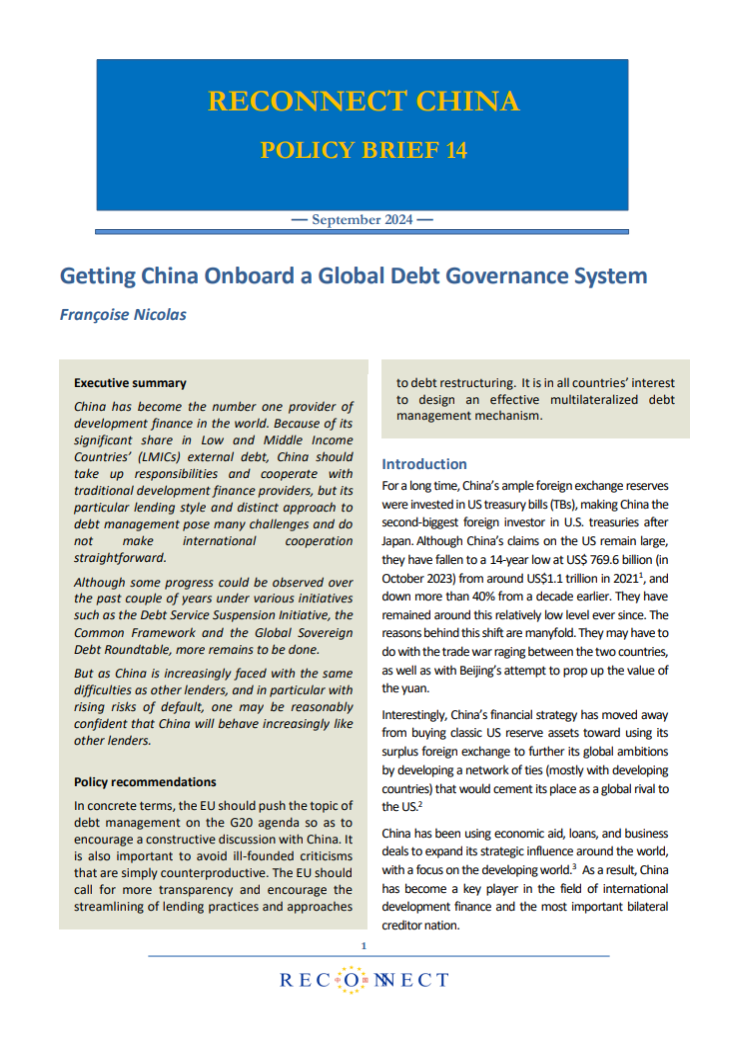Getting China Onboard a Global Debt Governance System

China has become the number one provider of development finance in the world. Because of its significant share in Low and Middle Income Countries’ (LMICs) external debt, China should take up responsibilities and cooperate with traditional development finance providers, but its particular lending style and distinct approach to debt management pose many challenges and do not make international cooperation straightforward.
Although some progress could be observed over the past couple of years under various initiatives such as the Debt Service Suspension Initiative, the Common Framework and the Global Sovereign Debt Roundtable, more remains to be done. But as China is increasingly faced with the same difficulties as other lenders, and in particular with rising risks of default, one may be reasonably confident that China will behave increasingly like other lenders.
In concrete terms, the EU should push the topic of debt management on the G20 agenda so as to encourage a constructive discussion with China. It is also important to avoid ill-founded criticisms that are simply counterproductive. The EU should call for more transparency and encourage the streamlining of lending practices and approaches to debt restructuring. It is in all countries’ interest to design an effective multilateralized debt management mechanism.
ReConnect China is a research project dedicated to strengthening independent knowledge on China in Europe. Funded as part of the European Commission’s Horizon Europe program, the four-year project brings together 15 institutions and 66 researchers across 12 European countries. Ifri will contribute policy briefs such as this one throughout the lifespan of the project, ranging from science and technology to China’s economy to foreign policy and China’s place in international affairs.

Available in:
Themes and regions
Share
Download the full analysis
This page contains only a summary of our work. If you would like to have access to all the information from our research on the subject, you can download the full version in PDF format.
Getting China Onboard a Global Debt Governance System
Related centers and programs
Discover our other research centers and programsFind out more
Discover all our analyses
RAMSES 2024. A World to Be Remade
For its 42nd edition, RAMSES 2024 identifies three major challenges for 2024.

France and the Philippines should anchor their maritime partnership
With shared interests in promoting international law and sustainable development, France and the Philippines should strengthen their maritime cooperation in the Indo-Pacific. Through bilateral agreements, expanded joint exercises and the exchange of best practices, both nations can enhance maritime domain awareness, counter security threats and develop blue economy initiatives. This deeper collaboration would reinforce stability and environmental stewardship across the region.

The China-led AIIB, a geopolitical tool?
The establishment of the Asian Infrastructure Investment Bank (AIIB) in 2016, on a Chinese initiative, constituted an attempt to bridge the gap in infrastructure financing in Asia. However, it was also perceived in the West as a potential vehicle for China’s geostrategic agendas, fueling the suspicion that the institution might compete rather than align with existing multilateral development banks (MDBs) and impose its own standards.
Jammu and Kashmir in the Aftermath of August 2019
The abrogation of Article 370, which granted special status to the state of Jammu and Kashmir (J&K), has been on the agenda of the Bharatiya Janata Party (BJP) for many decades.









